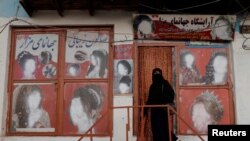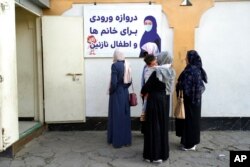Afghanistan's Taliban administration has ordered hundreds of female-run beauty salons to close within a month, the latest in a series of curbs blocking women's access to work and public spaces in the poverty-stricken country.
The Taliban Ministry for the Prevention of Vice and Propagation of Virtue has notified authorities in the capital, Kabul, and provinces to immediately enforce the ban and cancel the licenses of all the salons. It said that the directive had stemmed from a decree issued by the reclusive Taliban supreme leader, Hibatullah Akhundzada.
The morality ministry spokesman confirmed the notice Tuesday and did not share more information.
"The deadline for the closing of beauty parlors for women is one month," Mohammad Sadiq Akif said in a brief text message to journalists. The ministry warned of legal action against violators but did not elaborate.
Since reclaiming power in Afghanistan nearly two years ago, the Taliban have prohibited girls from pursuing education beyond the sixth grade, ordered many female government workers to stay home, and barred the United Nations and other aid groups from employing women.
Public places like parks, gyms, and bathhouses are closed to female visitors.
Makeup artists working in beauty salons said the latest ban would render thousands of women jobless amid Afghanistan's dire economic crisis and threaten the survival of their families because there are no jobs for male family members.
"When men cannot support their families due to unemployment, women are forced to work in a beauty salon to earn a livelihood," Raihan Mubariz, a female makeup artist, said while talking to the Afghan TOLO news channel. "What are we going to do if they shut down parlors,” she asked.
"We don't need to leave our homes if our men can find jobs. Do they want us to starve to death?" asked another woman working in a Kabul beauty salon.
The U.N. called on the Taliban to halt the edict closing beauty salons.
“This new restriction on women’s rights will impact negatively on the economy and contradicts stated support for women entrepreneurship,” the U.N. office in Kabul said on Twitter.
The U.N. and the international community at large have demanded an end to restrictions on Afghan women's access to public life and education, warning the policies have made it "nearly impossible" for the world to grant legitimacy to the Taliban government.
Akhundzada has rejected calls for easing restrictions on women, insisting his government is running the country in line with Afghan culture and Islamic law or Sharia.
On Tuesday, Markus Poztel, the deputy special representative for the U.N. Assistance Mission in Afghanistan, again denounced restrictions on women and reiterated the demand for the Taliban to lift them before the country's reintegration into the global community.
"There is no middle ground on this issue. Afghanistan is the only country in the world which doesn't allow girls to go to school beyond grade six or to university. There is no discussion about this; it's not a bargaining chip. It has to be reversed," a U.N. statement quoted Poztel as saying.
He said the Taliban decrees "are detrimental to economic progress" in the country.
"Girls should have a say. Women should have a say in this society. [The de facto authorities] should revoke the ban as soon as possible. Otherwise, there will always be a shadow on the relations Afghanistan has with the international community,” Poztel stressed.
The Taliban waged a deadly insurgency and seized power in August 2021 when the United States and NATO allies withdrew all their troops from Afghanistan after nearly 20 years of involvement in the war.
The U.S.-led foreign forces invaded the country weeks after the September 2001 terrorist attacks against America and removed the then-Taliban government from power for sheltering al-Qaida leaders blamed for planning the carnage.






